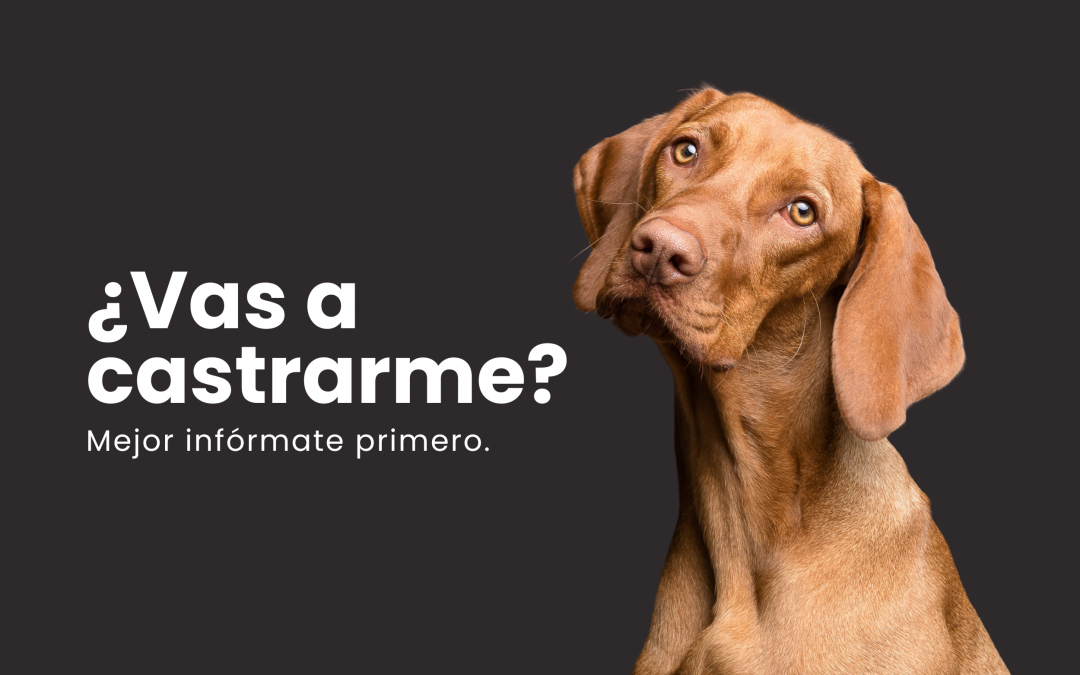Castration in dogs is one of the most common procedures performed on dogs. In many cases, it may be justified for health reasons or to prevent unwanted litters. However, it is also frequently recommended as a solution to certain behavioural problems, and that is where it is worth stopping to think more calmly.
In this article, I don’t want to talk only about the potential benefits. I think it’s important to highlight the risks and consequences which are not usually explained clearly. As a dog trainer, I often encounter neutered dogs that develop problems after the procedure, and I believe it is necessary to talk honestly about this issue.
What changes with neutering in dogs?
Removing the sexual organs not only stops the dog’s reproductive capacity. It also affects the production of hormones such as testosterone or oestrogen, which play a key role in many bodily functions and also in behaviour.
These hormones are not only related to sex drive. They also influence muscle development, immune system health, emotional stability, and stress regulation. Suppressing them can have significant side effects that you should be aware of before making a decision.
Potential effects on physical health
Although it is true that castration prevents specific diseases (such as pyometra, prostate problems, or certain types of tumours), it can also increase the risk of other disorders, including:
- Joint problems in large breeds (especially if neutered too early).
- Tendency to be overweight and changes in metabolism.
- Increased likelihood of developing diseases such as hypothyroidism, certain types of cancer, dermatitis, or immune disorders.
Castration in dogs is not a universal health guarantee, and the effects can vary depending on the breed, sex, age and context of the animal.
And behaviour? Does it really improve?
This is where most myths circulate. It is often thought that a neutered dog will be calmer, less aggressive, and easier to manage. But the reality is more complex.
- Testosterone, for example, acts as a stress regulator. It helps balance the body’s response to intense situations. By eliminating it, the dog may become more reactive, insecure or anxious, especially if they were already sensitive to begin with.
- Some studies show that, after castration, many dogs develop behaviours linked to fear or anxiety, such as excessive barking, hypervigilance or even aggression due to insecurity.
- In surveys conducted with families who neutered their dogs due to behavioural problems, half did not notice any improvement and a significant number reported new aggressive behaviours that did not exist before.
If castration is being considered for behavioural reasons, there is an interesting option to consider before making a final decision: chemical castration.. This reversible procedure simulates the hormonal effect of surgical neutering and lasts between 6 and 12 months.
If no behavioural changes are observed in the first two months, this is a clear indication that the problem is not related to sex hormones, but rather to behaviour, and should be addressed through education and emotional management.
The age at which dogs are neutered matters (a lot)
During growth, especially between 6 and 14 months, dogs go through sensitive phases in which emotional and behavioural patterns are consolidated. If hormone production is abruptly eliminated at this time, this development can be negatively disrupted.
- Dogs that are neutered at a very young age are more likely to develop fears, exaggerated reactions to sounds or stimuli, and difficulties in managing their environment.
- In females, a greater tendency towards reactivity, anxiety and aggression has also been observed after sterilisation, especially if it is performed before full maturity.
- There have even been links to cognitive impairment, possibly linked to a decrease in certain neuroprotective substances such as DHEA, which remain at higher levels in unspayed females.
So, do I recommend neutering?
It depends. There is no single answer that applies to all dogs.
The important thing is that the decision is not based on automatic responses or general advice. It must be evaluated. each case individually, taking into account the dog’s character, its environment, its stage of life and the possible medium- and long-term effects.
I always recommend talking to a vet who is up to date with the latest research, and if you have any doubts about behaviour, also seek the opinion of a professional dog trainer.
Neutering dogs is neither good nor bad in itself. It is a tool, and like any tool, It can be useful in some cases and counterproductive in others.. We should not use it as a quick fix for behavioural problems that require work, support and understanding.
Before making an irreversible decision, get informed, ask questions, observe your dog, and weigh all your options. Sometimes, educating is more effective than intervening.
And remember, if you have any questions or need assistance during this process, please do not hesitate to contact me. I will be delighted to help you!

